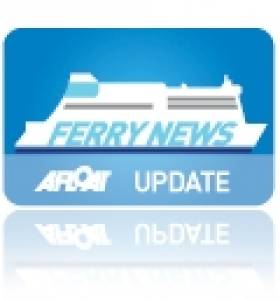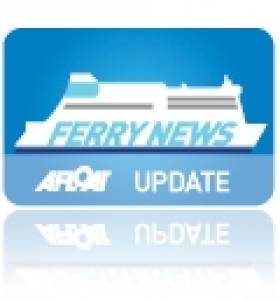Displaying items by tag: Northern Ireland Travel and Tourism Awards
Stena Line Voted 'Best Ferry Company'
#FerryAward – Stena Line was voted top ferry company for a record 21st year at the annual Northern Ireland Travel and Tourism Awards.
The 'Best Ferry Company' award was presented at a glittering awards ceremony last month in Newcastle, Co. Down.
Mervyn McNeely, one of the industry's most popular and charismatic characters, who retired last month from Stena Line after 40 years in the ferry industry, was inducted into the Travel Industry's Roll of Honour.
Northern Ireland Travel News has been organising the awards for the past 22 years and this year's ceremony was hosted by TV personality Les Dennis with more than 450 VIPs from the local travel and tourism industry attending.
Paul Grant, Route Manager for Stena Line – Irish Sea North, said: "This has been a busy year for Stena Line as since acquiring the Belfast-Liverpool route in 2010, we have been working on bringing the ships and service into line with the rest of the Stena Line proposition so it is a real honour to pick up this prestigious award in recognition of this work.
"We successfully completed the two ship refurbishments earlier this year and with improved facilities and additional services we can now offer our customers the same experience travelling the Irish Sea, whether they are going by Superfast from Belfast to Cairnryan or Supercruise from Belfast – Liverpool," he said.
"The travel industry is used to seeing innovation and high levels of customer service so when they say once again that we are the Best Ferry Company it underscores that the high standards we set ourselves lead the industry," Paul continued.
"I'm also delighted we have a double reason to celebrate as travel industry stalwart, Stena Line's Mervyn McNeely was inducted into the Roll of Honour.
"This is a fantastic and very well-deserved achievement for Mervyn who has retired after an incredible 40 years of service to the industry and I want to pass on my personal thanks to Mervyn for his work within Stena Line," he added.
Award Winning Stena Line Look Forward to New Northern Route
"We are moving into a very important time for Stena Line's operation between Northern Ireland and Scotland. On November 21 we are scheduled to start our new Belfast to Cairnryan service which will also see the introduction of two new vessels, Stena Superfast VII and Superfast VIII, the largest ships every to have sailed between Northern Ireland and Scotland," he continued.
Stena Line's switch of Scottish terminal from Stranrear to the new purpose built facility in Cairnryan which is some 8-miles closer to the open sea along Loch Ryan will reduce sailing times by 35 minutes down to 2 hours 15 minutes.
The 30,285grt Stena Superfast VII and Superfast VIII sisters can carry 1,200 passengers, 660 cars and 110 freight-unit / trucks. In addition they have a novel Nordic Spa facility incorporating a sauna and Jacuzzi.
The 206m pair will compete with rivals P&O (Irish Sea) which operates also from a neighbouring terminal in Cairnryan where another pair of sisters European Highlander and European Causeway provide 2-hour sailings to Larne.
Currently Belfast-Stranraer sailings are served by conventional tonnage ferries Stena Caledonia and Stena Navigator which lost engine-power on 14 October, to read more click HERE.
In addition fast-sailings are run by the expensive to operate HSS Stena Voyager which manages a faster crossing time on the existing route by shaving 15 minutes off the link between Loch Ryan and Belfast Lough. In 2008 the terminal in Belfast was relocated downriver to Victoria Terminal 4 (VT4) on the eastern edge of the port from the older inner-city terminal at Albert Quay.
Stena are to lease the 'Superfast' pair for three years from Scandinavia operator Tallink and they are to directly replace both the HSS and conventional ferries.






























































